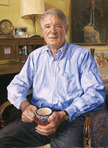Review: Purpose
This is a non-fiction book by Samuel T Wilkinson with the sub-title: What Evolution and Human Nature Imply About the Meaning of Our Existence. The leading blurb on the back cover says, “If you struggle to reconcile faith and reason, Sam Wilkinson’s profound book Purpose was written for you. You will be left with and understanding of the guiding forces behind human evolution and behaviour,” Arthur C Brooks, professor Harvard Kennedy School and Harvard Business School and #1 New York Times bestselling author.

Samuel T Wilkinson
Sam Wilkinson is an associate professor of psychiatry at Yale University, where he also as associate director of the Yale Depression Research Program. He received his MD from Johns Hopkins School of Medicine. His articles have been featured in the New York Times, the Washington Post, and the Wall Street Journal. He has been the recipient of many awards.
The book begins with a discussion of the ‘Scopes Monkey Trial’ in Tennessee in 1925. John Scopes, a twenty-four year old substitute teacher and football coach was charged with violation of the recently passed Butler Act, which made it a crime to teach any theory which contradicted the Bible. Scopes had taught evolution which claimed that human beings had evolved from apes (in contradiction of the Bible). Scopes, himself, had very little role in the trial. The key players were William Jennings Bryan, a three-time presidential candidate and outspoken apologist for religious fundamentalism, for the prosecution, and Clarence Darrow, the most prominent defense attorney in the US at the time, for the defense. During the trial, Darrow called Bryan as a witness, and that interrogation resulted in a painful and cruel renunciation of biblical literalism. The jury, however, accepted that Scopes was guilty and fined him $100. The Scopes Monkey Trial, says the author, epitomises the science vs religion debate.
Wilkinson next attacks the doctrine of randomness associated with the concept of evolution: that every change in the struggle for survival was accidental and random, without any guidance or control. If one believes that human beings are a random construction, what are we here for? If we are here for no reason, it suggests that there is no God. But the author shows that evolution was far from a random process. That, for example, very different species have developed the same eye technology in entirely different environments at different times. The same point can be made about wings and lungs. The evolution of bacteria can be predicted.
Wilkinson then turns to the various selection processes that determine which variant is the one most likely to survive: is it done on an individual basis, amongst kin, or groups or at multiple levels. Selection can take place at different levels depending on the context, with very different results. Based on theses observations, it is not difficult to see that given the same starting point and the same inputs, living things would evolve exactly as they did if the process were to start over.
Wilkinson points out that human beings have two different sets of behaviours: kind, gentile, thoughtful, cooperative and forgiving vs. selfish, aggressive, emotive, combative and irrational. These two sets of behaviour have evolved consistently with us and are present in each of us to some extent. It is noted that even the ‘negative set’ have survival benefits in some circumstances. Wilkinson presents evidence that as human beings we are happiest when we have good relationships with others. On this basis, the author argues that life is meant as a test for us: how can we use our skills to maximise our good relations with others? He says there is certainly space to believe in a God who has given us free will and the opportunity to use our lives to benefit others.
Wilkinson presents well thought out arguments very clearly with a host of factual data. One cannot say he is wrong. He admits to a belief in God, but his belief is not part of his argument. He leaves it to the reader to draw her own conclusions, but don’t miss this read!



